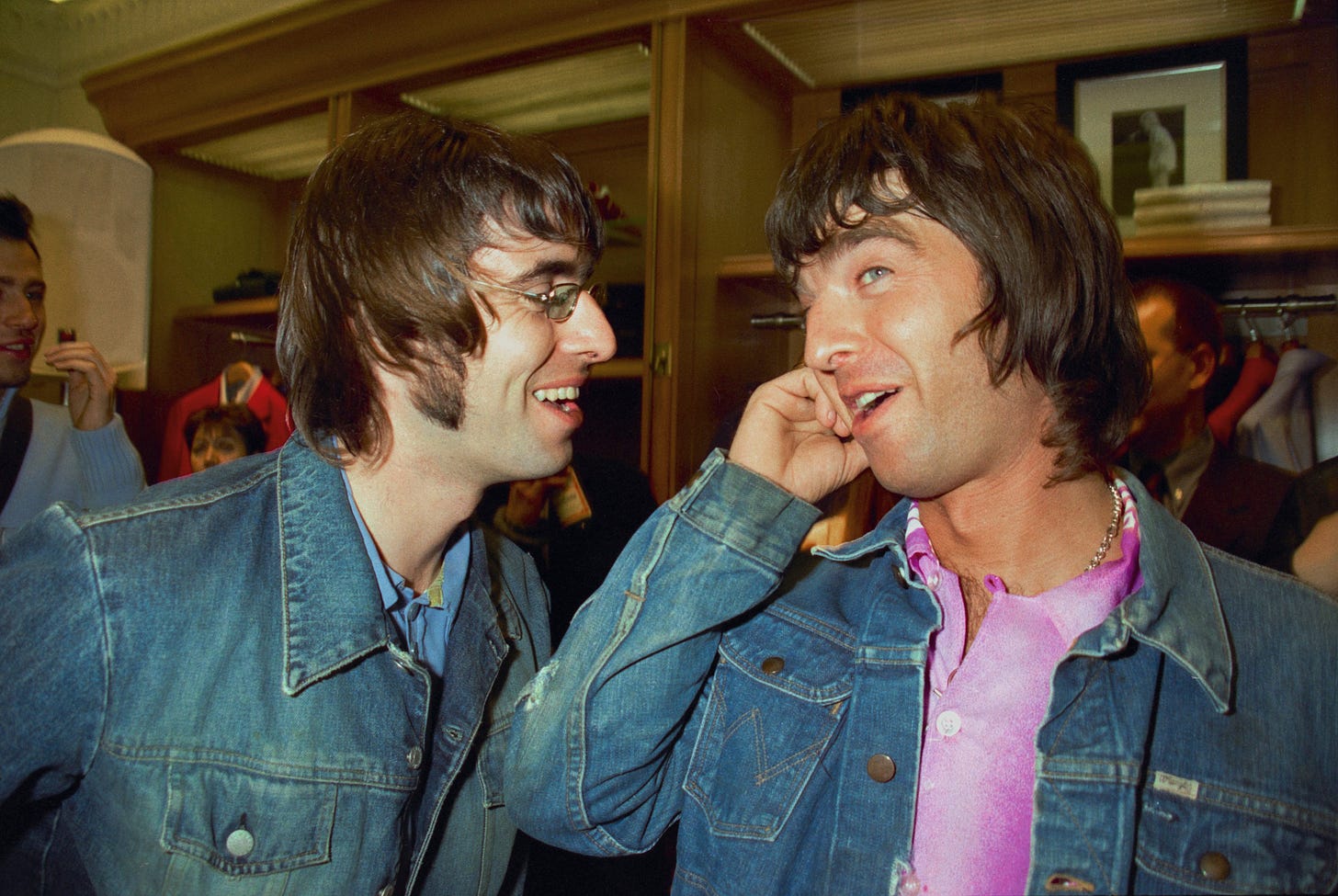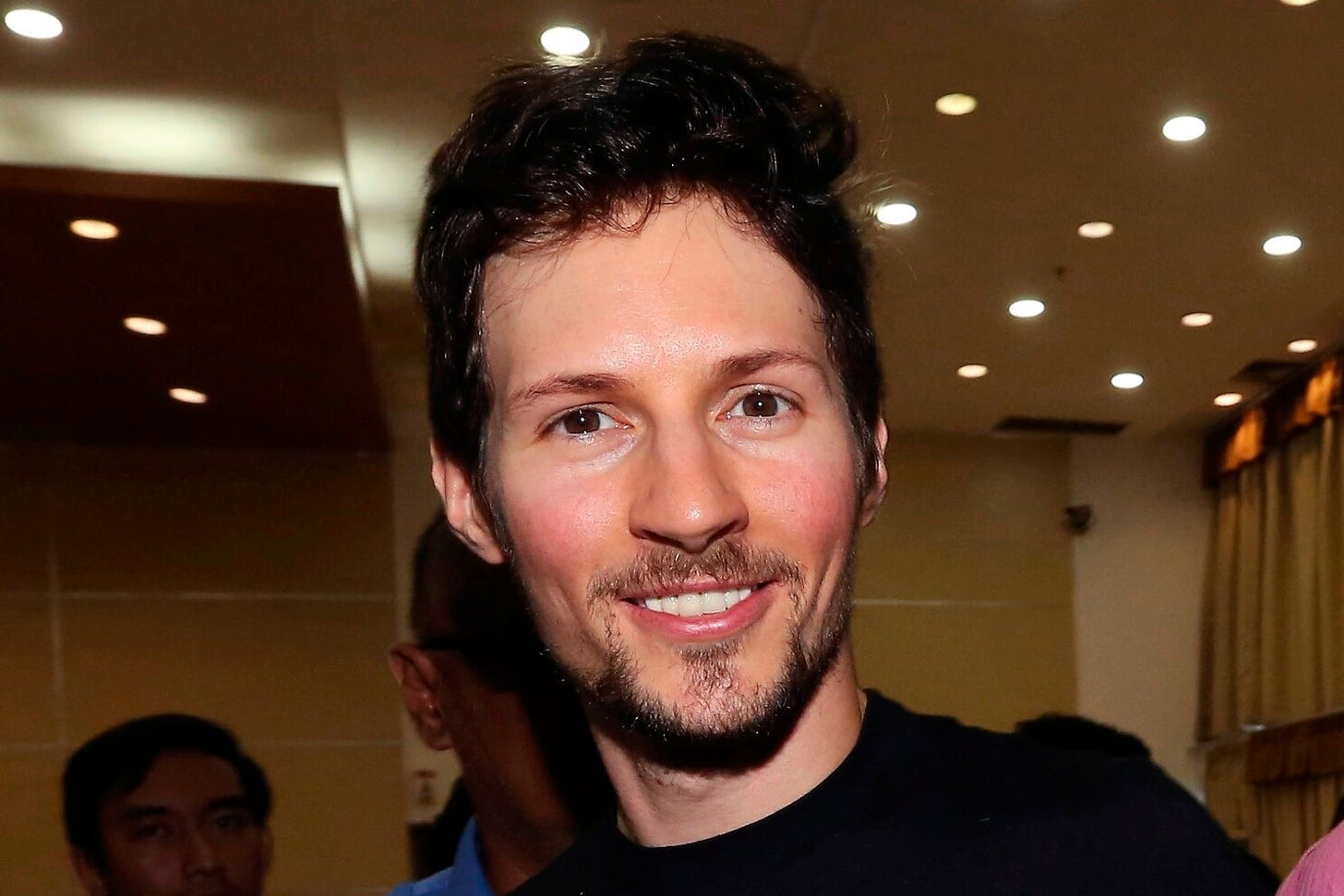Borkowski Media Trends: Oasis, Smoking Ban & Telegram
Oasis are BACK, more government smoking ban chatter and Telegram's Pavel Durov ARRESTED.
Oasis, or just another symbol of our cultural desert?
Oasis’ reunion after a bitter but also - for many observers - undeniably entertaining 16-year feud between the Gallagher brothers is the UK showbiz story of the year so far.
Such is the projected demand for tickets to the spree of stadium gigs that Oasis’ reunion tour could end up popularly and economically outmatching the impact of Taylor Swift’s record-shattering Eras in this country and Ireland, with 1.1 million tickets set to sell out almost instantly, and rumours of further dates yet to be added.
Nobody’s surprised that this is the case; Oasis is one of the most famous and popular bands the country has produced in the past 30 years and an enduring symbol of the 90s. The brothers’ hellraising (without ever getting fully ‘cancelled’) and domestic squabbles have only buttressed their legend.
Plus, if there’s one thing Brits love as much as a drama, it’s drama with a satisfying resolution. To use a comparison the Gallaghers themselves have been known to deploy; if Princes William and Harry are ever photographed or filmed shaking hands again, it will instantly become one of the iconic images in the history of this country. Liam and Noel reuniting is not far behind for many people in the satisfaction stakes.
Oasis somehow managed to transcend music by showing that rock stars didn’t have to be artists and could in-fact be monosyllabic, lager-swilling thugs in overgrown mod haircuts, parkas and tracksuit bottoms.
This made them more accessible to generations of fans, particularly young men, who basically worried that interest in anything too refined might make them look wimpy, but it’s also part of the reason they remain a polarising force.
Writing in the Guardian, in an article which brilliantly straddled rage-bait and authentic cri de cœur, music critic Simon Price described Oasis as “the most damaging pop-cultural force in recent British history”, citing a grubby charge sheet of homophobic and other offensive statements – and went on to conclude that their music is also rubbish.
This is far from a fringe view but it’s proof that in our modern age universal popularity is both impossible and unnecessary. Oasis have never tried to please everyone, and made a lot of enemies along the way; but they’ve also made enough friends who enjoy them for what they are - offensive views, rudeness, terrible haircuts and all - to secure another few afternoons in the sun, and an historic motherload of a payday.
Labour’s smoking ban sparks backlash
Labour began the week with the announcement that the country should brace for a return to austerity, with Keir Starmer delivering a speech that warned of a painful budget, difficult decisions and the dismal state of public finances. It was another intervention from a government that has arguably not yet managed to get out of campaign mode - attacking the Tories remains the default setting, and Starmer has perhaps struggled to define his government as being ‘for’ something rather than against what went before.
But if there’s one thing that went well for the New Labour of old it was, of course, the indoor smoking ban, a lasting legacy of public health (and hygiene). The Tobacco and Vapes Bill proposed by the Tories and revived by the current government is set to ban disposable vapes, as well as gradually raising the legal age smoking age - but a new addition, a ban on smoking outside pubs, clubs, hospitals, universities and in some parks, is a policy entirely of the Labour party’s own making. There are arguments in favour of this, particularly, as Jacqui Smith noted this morning, that 80,000 people a year die from smoking-related illnesses. As several economists and landlords pointed out, however, it’s a significant blow to the hospitality sector, which has struggled so drastically in recent years – keeping people at home rather than getting them into the pub is a somewhat backwards way of encouraging growth and spending.
The subsequent debate, and social media scorn, was rather inevitable, with Esther McVey notably quoting Martin Niemoller’s iconic “First the came...” poem in defence of her right to light up. While this is of course absurd, it does demonstrate the strength of feeling the issue creates – even as it now feels impossible to imagine indoor smoking, the initial ban in 2007 had its passionate detractors. The fact, then, that the policy was leaked rather than initially announced poses an interesting question – was this, a topic almost guaranteed to dominate the airwaves, a convenient bit of misdirection from the Prime Minister’s depressing economic assessment?
Telegram CEO’s arrest fuels controversy
The French authority’s arrest of Telegram CEO Pavel Durov has quietly become a major story that has sparked the conspiracy theory rumour mill and troubled free speech advocates, given the nature of the platform itself and Durov’s background. Given that Elon Musk and Mark Zuckerberg are such prominent celebrities who own massive social media platforms, it almost feels rare for a Durov-type character to be more obscure, especially when Telegram outperforms X with over 1 billion active users.
Russian-born Durov rose to fame, emulating Zuckerberg by creating his own Facebook, ‘VKontakte’, only to be taken over by the Russian government, prompting him to leave Russia. He then created Telegram, a messaging platform resembling WhatsApp that adopted the social media community aspect, which is prevalent in countries like India, Iran, and Russia. He’s a mysterious and elusive figure, rarely doing interviews with the mainstream press, jetting around the world popping up with the odd, eccentric stunt, like throwing bundles of cash from buildings to people on the street.
So why is this important? While Telegram is a vital communication tool for those living under autocratic regimes, a sizeable userbase takes advabtage of the platform’s sophisticated encryption software for nefarious reasons, and Durov’s lack of cooperation with global authorities has put a target on his back, sparking this arrest by the French government. And given that Durov is a French citizen who’s been reluctant to support many high-profile incidents, including a child abuse case, it was only a matter of time.
It might be too early to speculate on the broader ramifications of this story, but it’ll be interesting to follow how Durov is reprimanded and what it means for the platform’s future.







